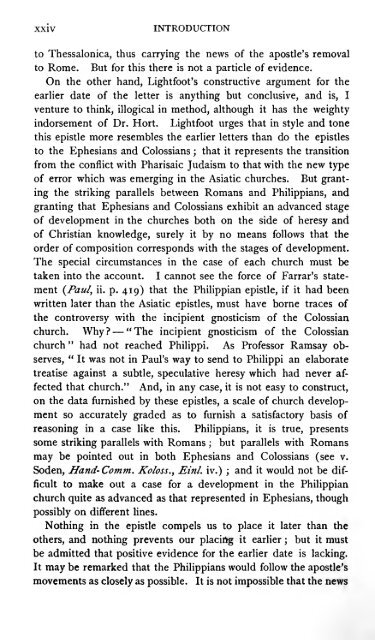Philippians and Philemon - MR Vincent - 1906.pdf
Philippians and Philemon - MR Vincent - 1906.pdf
Philippians and Philemon - MR Vincent - 1906.pdf
You also want an ePaper? Increase the reach of your titles
YUMPU automatically turns print PDFs into web optimized ePapers that Google loves.
xxiv INTRODUCTION<br />
to Thessalonica, thus carrying the news of the apostle's removal<br />
to Rome. But for this there is not a particle of evidence.<br />
On the other h<strong>and</strong>, Lightfoot's constructive argument for the<br />
earlier date of the letter is anything but conclusive, <strong>and</strong> is, I<br />
venture to think, illogical in method, although it has the weighty<br />
indorsement of Dr. Hort. Lightfoot urges that in style <strong>and</strong> tone<br />
this epistle more resembles the earlier letters than do the epistles<br />
to the Ephesians <strong>and</strong> Colossians ; that it represents the transition<br />
from the conflict with Pharisaic Judaism to that with the new type<br />
of error which was emerging in the Asiatic churches. But grant-<br />
ing the striking parallels between Romans <strong>and</strong> <strong>Philippians</strong>, <strong>and</strong><br />
granting that Ephesians <strong>and</strong> Colossians exhibit an advanced stage<br />
of development in the churches both on the side of heresy <strong>and</strong><br />
of Christian knowledge, surely it by no means follows that the<br />
order of composition corresponds with the stages of development.<br />
The special circumstances in the case of each church must be<br />
taken into the account. I cannot see the force of Farrar's statement<br />
{Paul, ii. p. 419) that the Philippian epistle, if it had been<br />
written later than the Asiatic epistles, must have borne traces of<br />
the controversy with the incipient gnosticism of the Colossian,<br />
church. Why?— "The incipient gnosticism of the Colossian<br />
church " had not reached Philippi. As Professor Ramsay ob-<br />
serves, " It was not in Paul's way to send to Philippi an elaborate<br />
treatise against a subtle, speculative heresy which had never af-<br />
fected that church." And, in any case, it is not easy to construct,<br />
on the data furnished by these epistles, a scale of church development<br />
so accurately graded as to furnish a satisfactory basis of<br />
reasoning in a case like this. <strong>Philippians</strong>, it is true, presents<br />
some striking parallels with Romans ; but parallels with Romans<br />
may be pointed out in both Ephesians <strong>and</strong> Colossians (see v.<br />
Soden, H<strong>and</strong>-Comm. Koloss., Einl. iv.) ; <strong>and</strong> it would not be dif-<br />
ficult to make out a case for a development in the Philippian<br />
church quite as advanced as that represented in Ephesians, though<br />
possibly on different Hues.<br />
Nothing in the epistle compels us to place it later than the<br />
others, <strong>and</strong> nothing prevents our placing it earlier ; but it must<br />
be admitted that positive evidence for the earlier date is lacking.<br />
It may be remarked that the <strong>Philippians</strong> would follow the apostle's<br />
movements as closely as possible. It is not impossible that the news





